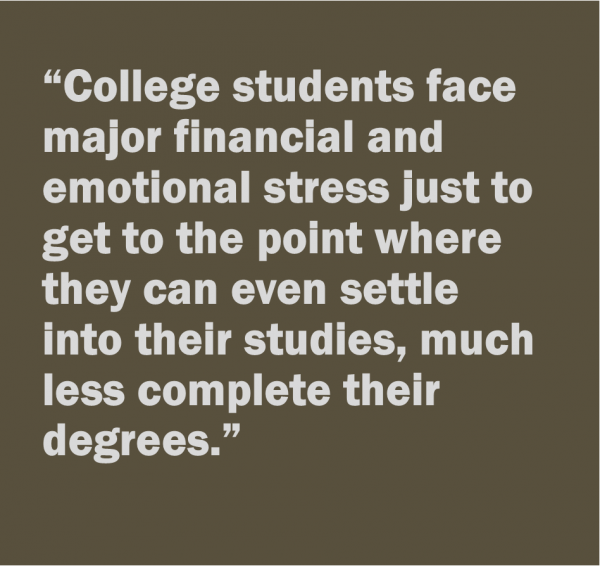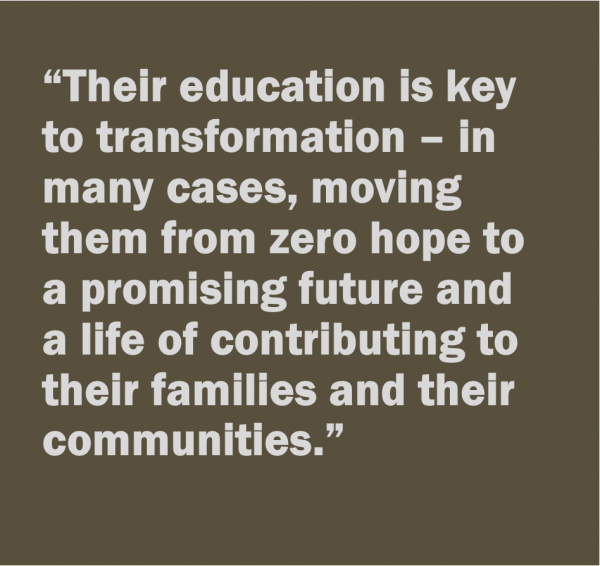PERSPECTIVE: Do Community College Students Go Begging?
/by Endia DeCordova
A professor at Manchester Community College noticed that a student – typically a regular class attendee – had stopped coming. Efforts to contact the student ultimately revealed that she had given up on many of her goals, including her education, because of depression. Having her electricity turned off because she couldn’t afford the bill was the last straw.
A staff member at the college was approached by a student who asked to borrow a dollar for the vending machine. He had to remain on campus all day -- through an evening course -- and couldn’t afford to buy anything from the cafeteria.
One more anecdote involves a student who dropped out because of an inability to scrape up bus fare. That student relied on public transportation to get everywhere, including to class.
 These are true stories. The names are omitted and details smoothed over for obvious reasons. But they really happened this spring at MCC. The image of the college student – not a care in the world – partying and protesting, cramming just in time to pass an exam, and simply marking time until graduation has never really been accurate. It is certainly far from the truth today. College students face major financial and emotional stress just to get to the point where they can even settle into their studies, much less complete their degrees.
These are true stories. The names are omitted and details smoothed over for obvious reasons. But they really happened this spring at MCC. The image of the college student – not a care in the world – partying and protesting, cramming just in time to pass an exam, and simply marking time until graduation has never really been accurate. It is certainly far from the truth today. College students face major financial and emotional stress just to get to the point where they can even settle into their studies, much less complete their degrees.
In fact, the story of the borrowed candy-bar dollar is especially heartbreaking as it makes clear how much of a hurdle food-insecurity is for an increasing number of college students. A February 2016 article in The Chronicle of Higher Education, “Students Shouldn’t Have to Choose Between Books and Food,” highlights the disturbing data on hunger among college students. According to a 2015 study by the Wisconsin HOPE Lab, 20 percent of community-college students were going hungry. Another, by City University of New York, found that 39 percent of its students were similarly at risk.
This underscores a major issue for college students nationally. How is it that higher ed creates poverty among people who are clearly working to improve their lives?
Rising costs of tuition, fees and books are easy to point to. At MCC, people are struggling to pay for higher education and after they enroll, often can’t follow through. For the spring 2016 term, nearly 900 students who applied to MCC paid their application fee but did not enroll. Another nearly 500 students enrolled but couldn’t complete their payments and were forced to drop out for lack of financial resources. Of those, many struggled to buy books or other class materials.
But the real issue is running just below the surface. Common sense tells us all that if you can’t afford to pay for something that is essentially a luxury – or a privilege, as many still view a college degree – you don’t buy it.
For many MCC students, not going to college is not an option. Their education is key to transformation – in many cases, moving them from zero hope to a promising future and a life of contributing to their families and their communities.
Yet as they forge ahead, they go begging for the basics. As the students above tragically did, they too often give up short of their goals. At the same time, public funds in Connecticut for higher ed are dropping.
This is why MCC is working through its foundation to develop a retention and completion grant program. Like many community colleges nationwide, we are determined to support students who have delayed starting college or “stopped out” of college because of short-term financial distress.
We ask students to assume some of the risk connected with the funding so they remain vested in their futures, but these grants (not loans) are designed to help them pay for the books -- or the bus pass, the electricity, the food they need -- to keep going and to graduate or transfer.
A college education today is a necessity. No one should have to beg.
__________________
Endia DeCordova is Dean of Institutional Advancement and Community Engagement for Manchester Community College.
PERSPECTIVE commentaries by contributing writers appear each Sunday on Connecticut by the Numbers.
LAST WEEK: Face Your Fears - and the Editorial Board






























